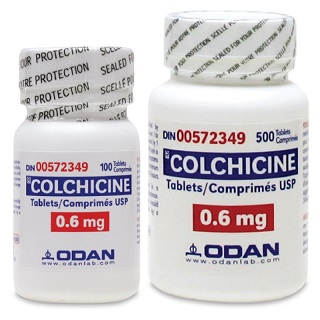University Of Virginia Study Shows That Colchicine, A Drug To Treat Gout Also Helps Improves Survival Rates Of Heart Failure Patients!
Source: Colchicine-Heart Failure Jun 20, 2022 3 years, 7 months, 3 weeks, 4 days, 22 hours, 28 minutes ago
A new study by medical researchers from the University of Virginia-USA has found that the common and cheap drug that is used to treat gout-
Colchicine, also helps improve the survival rates of heart failure patients.

Considering that the incidences of heart failures has increased tremendously during the COVID-19 pandemic due to suspected links between the SARS-CoV-2 virus and the direct and indirect effects that it causes on the heart, this new study findings comes at an appropriate time.
It has been found that gout is a common comorbidity in heart failure (HF) patients and is frequently associated with acute exacerbations during treatment for decompensated HF.
Though
colchicine is often used to manage acute gout in HF patients, its impact on clinical outcomes when used during acute decompensated HF is unknown.
The study team conducted a single center, retrospective study of hospitalized patients treated for an acute HF exacerbation with and without acute gout flare between March 2011 and December 2020.
The study team assessed clinical outcomes in patients treated with
colchicine for a gout flare compared to those who did not experience a gout flare or receive colchicine. The primary outcome was in-hospital all-cause mortality.
The study findings showed that among 1047 patient encounters for acute HF during the study period, there were 237 encounters (22.7%) where the patient also received
colchicine for acute gout during admission. In-hospital all-cause mortality was significantly reduced in the
colchicine group compared with the control group (2.1% vs. 6.5%, p = .009).
The
colchicine group had increased length of stay (9.93 vs. 7.96 days, p < .001) but no significant difference in 30-day readmissions (21.5% vs. 19.5%, p = .495). In a Cox proportional hazards model adjusted for age, inpatient
colchicine use was associated with improved survival to discharge (hazards ratio [HR] 0.163, 95% confidence interval [CI] 0.051−0.525, p = .002) and a reduced rate of in-hospital CV mortality (HR 0.184, 95% CI 0.044−0.770, p = .021).
The study findings showed that among patients with a HF exacerbation, treatment with
colchicine for a gout flare was associated with significantly lower in-hospital mortality compared with those not treated for acute gout.
The study findings were published in the peer reviewed journal: Clinical Cardiology.
https://onlinelibrary.wiley.com/doi/10.1002/clc.23830
The study findings reveal a new potential treatment option for a condition affecting 6 million Americans typically and more than 15 million Americans under the COVID-19 pandemic!
The study findings showed that
Colchicine, a common gout medication, dramatically increased the survival rates of
patients with worsening heart failure who were hospitalized.
In individuals with an accumulation of cholesterol in their arteries, the study team thinks that c
olchicine might also lower the risk for heart attack and stroke.
For the study, more than 1,000 patients who were hospitalized at the University of Virginia Medical Center between March 2011 and February 2020 due to worsening heart failure had their records examined.
It was interestingly found that individuals who took colchicine for a gout flare had a survival rate of 97.9%, as opposed to patients who did not receive colchicine, who had a survival rate of 93.5%.
Clinical investigator of the study, Dr Kenneth Bilchick, MD, MS, Professor of Cardiovascular Medicine at University of Virginia told Thailand
Medical News, “These study findings highlight the importance of novel inflammatory mechanisms in heart failure. The signal for benefit with
colchicine in these patients was very impressive, and I expect that these findings will have quite a significant impact on clinical care in heart failure and future research for patients with this condition.”
Dr Sula Mazimba, MD, MPH, a University of Virginia VA School of Medicine researcher and cardiologist specializing in heart failure added, “Heart failure is more than just a failure of the pumping function of the heart. There are other processes that are involved, especially during an acute hospitalization phase such as elevated inflammation and neurohormonal process. Many of the therapeutic agents for heart failure target neurohormonal pathways, but few if any target inflammatory pathways.”
Dr Sula Mazimba further added, “
Colchicine is a medication that has anti-inflammatory properties that could potentially attenuate the heightened inflammation that we see in patients who are hospitalized with heart failure.”
Typically, heart failure happens when the body’s ability to pump blood throughout the body fails. According to the American Heart Association, around 6 million Americans typically suffer heart failure, and the condition is responsible for more than 86,000 deaths each year.
The condition of gout, a kind of arthritis characterized by a buildup of uric acid crystals in the joints, is common in patients with heart failure.
Colchicine, steroids, and nonsteroidal anti-inflammatory drugs (NSAIDs) such as aspirin and ibuprofen are common treatments for gout, although steroids and NSAIDs are not typically given to heart failure patients due to their tendency to aggravate heart failure symptoms.
Although
colchicine is a well-established treatment for gout, the study team believes the medication’s anti-inflammatory properties may also be key to improving outcomes for heart failure patients. They think that
colchicine may modulate inflammation in the heart and blood vessels with the potential for improving outcomes, especially in the acute phases of heart failure hospitalizations.
Further detailed and larger studies to further explore
colchicine as a potential treatment option for heart failure are warranted, but the study team are also encouraged by their initial findings.
Dr Mary E. Roth, PharmD, a researcher and cardiovascular clinical pharmacist at University of Virginia further added, “We’re very excited about these study findings, especially given that colchicine is already a widely available medication. If additional studies confirm the results,
colchicine could be another tool we can utilize to improve the survival of our heart failure patients.”
For more on
Colchicine and
Heart Failure, keep on logging to Thailand
Medical News.
